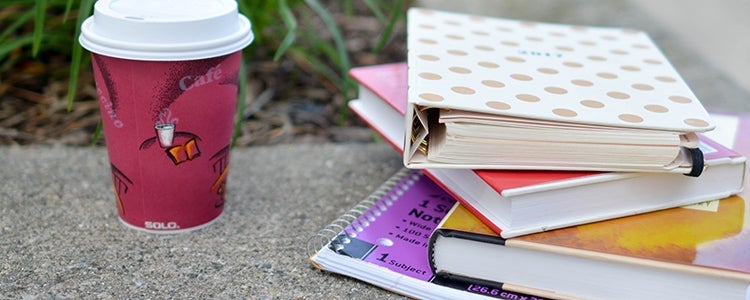
Written by Iman (she/her), student
It’s the night before a test and you're frantically taking notes and watching YouTube videos to review content for a test you should’ve started studying for weeks ago.
We’ve all been there, last minute studying for a test with no idea where to start. Luckily for you, I’ve compiled all the best study tricks I’ve learned to make sure you’re not studying through tears or immense stress the night before your next exam.
1. Start earlier than you think you need to
Procrastination is tempting but it’s always a recipe for panic. Starting your studying even a week in advance gives your brain time to absorb the material. Studying in smaller chunks over several days is way more effective than cramming everything into one night.
You’ll actually remember the material instead of just recognizing it for a few hours and forgetting it the next day. That way when the final comes around, you won’t have to relearn everything you studied for the first exam. Plus, when you get to university, that means you’ll remember the background knowledge you need to know to do well in your classes!
As soon as you find out your test date, create a simple plan. Divide the topics you need to cover and give yourself enough days to go over each one slowly. Be sure to give yourself at least a full week to study before each test.
I used to be a horrible procrastinator until I came to university. I quickly realized that procrastinating was not going to work if I wanted to keep my grades up. That’s when I started using Outlook as a study calendar and started booking study times for myself. Now that it's built into my day, it's much easier to not procrastinate.
2. Find what works for you
Instead of just rereading or highlighting your notes, test yourself. After reviewing a concept, close your book and try to write it out or say it out loud from memory. It’s called active recall, and it works way better than passive reading.
You can also use flashcards, practice questions, or even write a quick summary without looking at your notes. The more you practice pulling information from your brain, the more likely you are to remember it during the test.

3. Teach someone else
If you can explain a concept to someone else in simple terms, you probably understand it. Try teaching a friend, sibling, or even talking it through with yourself.
You’ll notice quickly if there’s a part you don’t fully get, and then you can go back and review just that section. Teaching is one of the fastest ways to spot gaps in your understanding.
I like studying with my friends and taking turns teaching each other concepts. It's a great way for all of us to learn and it makes studying more fun!
4. Take real breaks
Don’t try to study for hours straight. It sounds productive, but your brain will start to zone out after a while.
Try the Pomodoro method: 25 minutes of focused studying, followed by a 5-minute break. After four sessions, take a longer 15–30-minute break. Use that time to stretch, walk around, eat, or just breathe. You’ll come back more focused and less overwhelmed.
5. Cut out distractions
It’s hard to focus when your phone is constantly buzzing. Put it in another room or turn off notifications for a bit. If you need help, use apps like Forest or Focus Keeper to stay off your phone and on task.
Even 30 minutes of uninterrupted studying is more effective than two hours of half-studying, half-scrolling.

6. Practice with old tests or questions
If your teacher gives you review sheets or old tests, use them. Practicing under “test-like” conditions can help to reduce anxiety and get you used to the format.
If you don’t have past tests, make your own questions or quiz yourself using flashcards. The goal is to practice thinking the way you’ll need to during the actual exam.
7. Take care of your body
Studying doesn’t mean you should ignore sleep, food, or water. Those are the basics your brain needs to work properly.
Try to
- get at least seven hours of sleep the night before your test,
- eat something with protein and carbs (like toast and eggs or oatmeal), and
- stay hydrated.
It sounds simple, but skipping sleep or meals seriously messes with your ability to focus and remember things.
Studying doesn’t have to be about pulling all-nighters and memorizing every single word. Small, smart changes, like starting earlier, testing yourself, and staying off your phone, can make a huge difference.
Try out a few of these tips and see what works for you. You don’t need to be perfect; you just need to be consistent. And remember, you’ve got this!
Related articles

What's the best way to prepare for first-year math?
Are you gearing up for your first year of math? Discover the value of residence tutoring, the power of study groups, and why engaging with your professors can make all the difference. Ready to conquer your first year? Dive into this comprehensive guide to get prepared and stay ahead!

Top time management tips for students
The struggle to find a balance between getting good grades, joining extra-curricular activities, holding a part-time job, and still having time left over to enjoy personal pleasures. That’s why time management is extremely important for students — not only will you b

10 challenges you may encounter at university
University is an amazing time in your life. There’s the promise of new, exciting experiences, personal growth, and freedom. But it’s not without its own challenges and growing pains.

